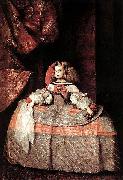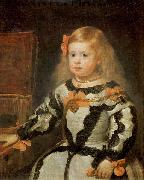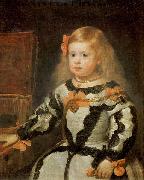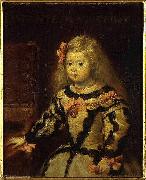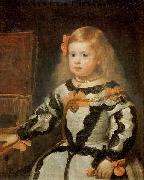Wholesale Oil Painting Reproductions No Minimum and Door to Door! |
|||||||||||
|
|
|||||||||||

|
|||||||||||
|
|
|
||||||||
All Juan Bautista Martinez del Mazo Oil Paintings |
||||||||
|
|
||||||||
|
|
||||||||
|
Artist Introduction: 1612-1667
Spanish
Juan Bautista Martinez del Mazo Gallery
Mazo??s works owe credit above all to Vel??zquez, whose style he was long compelled to emulate in court portraits. However, Mazo shows in his paintings a personality of his own. His portraits exhibit startling naturalism and marvelously executed. Mazo was specially skillful in painting small figures, a cardinal element in both his hunting scenes and the landscapes he painted as in his most celebrate work View of Saragossa.
Mazo??s palette was rather like that of Vel??zquez, except for a penchant often shown for stressing blue or bluish tints. .The departure from his master style was in his way of shaping people and things by highlights which flash the pictorial image towards the surface of the painting, even from the background.. As a counterbalance, an explicit, even emphatic, perspective design marks out the spatial confines of the composition, making it appear squarish.. A further departure from Velazquez is his luxurious depiction of detail or incident, which he achieved with brilliant, depthless strokes, whether on the figure of a sitter, a curtain on a wall, a floor, the surface of a river, or plain grounds. .These stylistic traits reveal Mazo??s own personality as an artist. .For centuries, Mazo??s paintings were attributed to Vel??zquez, but modern art criticism, techniques and knowledge have been able to separate their works. |
||||||||
|
|
||||||||
|
Retrato de la infanta Margarita Painting ID:: 76573 |
ca. 1659(1659)
Oil on canvas
212 ?? 147 cm (83.5 ?? 57.9 in)
cjr |
|||||||
Height Width |
INS/CM Quality |
|||||||
|
X |
| |||||||
|
|
||||||||
All Diego Velazquez Oil Paintings |
||||||||
|
|
||||||||
|
|
||||||||
|
Artist Introduction: Spanish Baroque Era Painter, 1599-1660
Spanish painter. He was one of the most important European artists of the 17th century, spending his career from 1623 in the service of Philip IV of Spain. His early canvases comprised bodegones and religious paintings, but as a court artist he was largely occupied in executing portraits, while also producing some historical, mythological and further religious works. His painting was deeply affected by the work of Rubens and by Venetian artists, especially Titian, as well as by the experience of two trips (1629-31 and 1649-51) to Italy. Under these joint influences he developed a uniquely personal style characterized by very loose, expressive brushwork. Although he had no immediate followers, he was greatly admired by such later painters as Goya and Manet |
||||||||
|
|
||||||||
|
|
Retrato de la infanta Margarita Painting ID:: 78635 |
1653(1653)
Medium Oil on canvas
Dimensions 70 x 59 cm (27.6 x 23.2 in)
cyf |
||||||
Height Width |
INS/CM Quality |
|||||||
|
X |
| |||||||
|
|
||||||||
All Diego Velazquez Oil Paintings |
||||||||
|
|
||||||||
|
|
||||||||
|
Artist Introduction: Spanish Baroque Era Painter, 1599-1660
Spanish painter. He was one of the most important European artists of the 17th century, spending his career from 1623 in the service of Philip IV of Spain. His early canvases comprised bodegones and religious paintings, but as a court artist he was largely occupied in executing portraits, while also producing some historical, mythological and further religious works. His painting was deeply affected by the work of Rubens and by Venetian artists, especially Titian, as well as by the experience of two trips (1629-31 and 1649-51) to Italy. Under these joint influences he developed a uniquely personal style characterized by very loose, expressive brushwork. Although he had no immediate followers, he was greatly admired by such later painters as Goya and Manet |
||||||||
|
|
||||||||
|
|
Retrato de la infanta Margarita Painting ID:: 79310 |
. 1653(1653)
Medium Oil on canvas
Dimensions 70 x 59 cm (27.6 x 23.2 in)
cyf |
||||||
Height Width |
INS/CM Quality |
|||||||
|
X |
| |||||||
|
|
||||||||
All Diego Velazquez Oil Paintings |
||||||||
|
|
||||||||
|
|
||||||||
|
Artist Introduction: Spanish Baroque Era Painter, 1599-1660
Spanish painter. He was one of the most important European artists of the 17th century, spending his career from 1623 in the service of Philip IV of Spain. His early canvases comprised bodegones and religious paintings, but as a court artist he was largely occupied in executing portraits, while also producing some historical, mythological and further religious works. His painting was deeply affected by the work of Rubens and by Venetian artists, especially Titian, as well as by the experience of two trips (1629-31 and 1649-51) to Italy. Under these joint influences he developed a uniquely personal style characterized by very loose, expressive brushwork. Although he had no immediate followers, he was greatly admired by such later painters as Goya and Manet |
||||||||
|
|
||||||||
|
|
Retrato de la infanta Margarita Painting ID:: 80057 |
after 1655(1655)
Medium Oil on canvas
Dimensions 14 x 12 cm (5.5 x 4.7 in)
cyf |
||||||
Height Width |
INS/CM Quality |
|||||||
|
X |
| |||||||
|
|
||||||||
All Diego Velazquez Oil Paintings |
||||||||
|
|
||||||||
|
|
||||||||
|
Artist Introduction: Spanish Baroque Era Painter, 1599-1660
Spanish painter. He was one of the most important European artists of the 17th century, spending his career from 1623 in the service of Philip IV of Spain. His early canvases comprised bodegones and religious paintings, but as a court artist he was largely occupied in executing portraits, while also producing some historical, mythological and further religious works. His painting was deeply affected by the work of Rubens and by Venetian artists, especially Titian, as well as by the experience of two trips (1629-31 and 1649-51) to Italy. Under these joint influences he developed a uniquely personal style characterized by very loose, expressive brushwork. Although he had no immediate followers, he was greatly admired by such later painters as Goya and Manet |
||||||||
|
|
||||||||
|
|
Retrato de la infanta Margarita Painting ID:: 80069 |
between 1654(1654) and 1655(1655)
Medium Oil on canvas
cyf |
||||||
Height Width |
INS/CM Quality |
|||||||
|
X |
| |||||||
|
|
||||||||
|
Prev Next
|
||||||||
|
|
||||||||
|
Related Paintings to Diego Velazquez :. |
||||||||
|
|
||||||||
|
CONTACT US |
